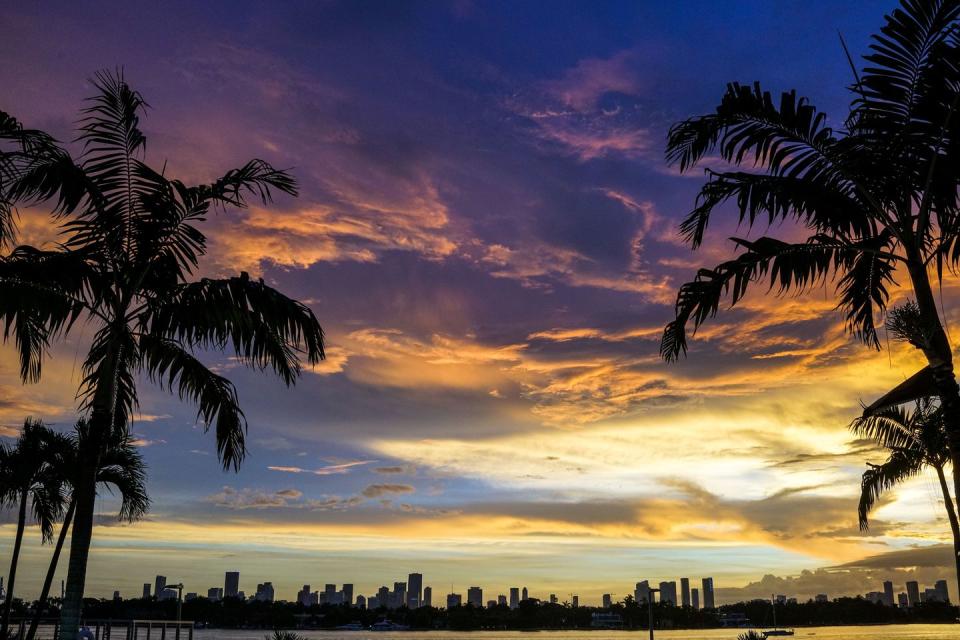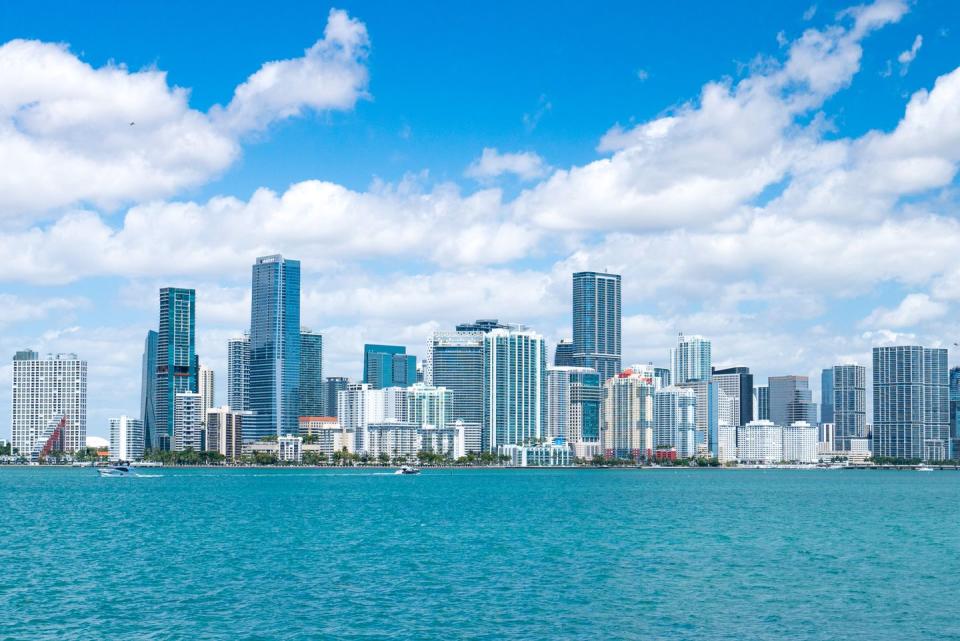Is Miami Becoming a Tech Utopia, or Just a Sunny Place for Shady People?

- Oops!Something went wrong.Please try again later.
Two years ago Demian Bellumio, a Miami-based investor, was a recent divorcé with a less than full dance card, so he decided to create a WhatsApp group for the city’s budding tech scene.
“I’ve always loved being a connector,” he says, “and there were new people in Miami, so I arranged for us all to occasionally get together to sail, fish, have dinner. It was all very organic and low-key.”
Low-key? In Miami? Good luck. In the time since, this Southern capital of sea, sun, and sin has mushroomed, with a conga line of rainmakers lured by the city’s seductive mix of year-round sunshine, permissive coronavirus safety guidelines, scantily clad locals, and skimpy taxes, not to mention the efforts of Mayor Francis Suarez, whose open-armed cajoling is reminiscent of a spruiker outside a strip club.
“I’ve been working in tech for more than 20 years,” Bellumio says, “and I’ve never seen anything like the last six months.”
The list of well-known newcomers fighting over Tesla chargers and tables at hotspots like Carbone and Swan includes Peter Thiel, the billionaire co-founder of PayPal who recently paid $18 million for two adjacent mansions in the Venetian Islands; Keith Rabois, the startup investor and Thiel’s partner at the venture capital firm Founders Fund, who paid $29 million for a nearby mansion; Jack Abraham, the precocious CEO behind VC powerhouse Atomic; Shervin Pishevar, an early investor in Uber and Airbnb; Blumberg Capital founder David Blumberg; and Uber’s former chief business officer Emil Michael.

And if some of these transplanted bros are a little too taken by the city’s temptations, so be it. “I’m not going to pass judgment,” says Mera Rubell, an influential art collector who, along with her husband Don, infamously opened a gallery in 1993 on the site of a former DEA warehouse. “Maybe they can go to the museums in the day and the clubs at night. I assure you Miami will embrace these people with open arms. Money talks, nobody walks.”
“Miami today reminds me of New York 20 years ago,” says Jon Oringer, the deep-pocketed founder of the stock media company Shutterstock, who moved from New York last October and paid $42 million for a waterfront mansion once owned by Alex Rodriguez.
“I was ready for a change,” Oringer adds, “and once Covid struck, it became clear to me that we can now work anywhere and collaborate with anyone, regardless of where they live.”
He and the entrepreneur Edward Lando set up a new investment concern called Pareto Holdings to incubate new companies with the goal of building a unicorn (a billion-dollar business) over the next few years. And they’re not alone: The troubled Japanese conglomerate (and early WeWork backer) SoftBank set aside $100 million for new ventures in the area, and Blackstone Group relocated its tech division to downtown Miami, where Apollo Global Management, Citadel, and Goldman Sachs are also reportedly scoping out office space.

PALO ALTO ON THE BEACH
It’s not the first time the city has attempted to become a Speedo-wearing alternative to Silicon Valley. In the mid- to late ’90s, a slew of vainglorious startups raised millions of dollars and plastered the beach with billboards. But despite the early fanfare there were few wins to boast of. Alienware, the gaming PC maker founded in 1996 by childhood friends Nelson Gonzalez and Alex Aguila, was acquired by Dell in 2006 for an undisclosed amount, and Terremark Worldwide became one of the city’s first unicorns when it was sold to Verizon for $1.4 billion in 2011.
But with the exception of Chewy, the pet food e-tailer based in nearby Broward County that was acquired in 2017 by PetSmart for $3.35 billion, success stories in the intervening years have been as rare as an available poolside cabana at the Four Seasons on a summer afternoon.
The infrastructure was simply not in place. “It was impossible to get anything done here,” says Martin Varsavsky, an Argentine tech entrepreneur who specializes in health and telecommunications. Varsavsky lived in Miami for three years starting in 2014, but he found the experience frustrating and eventually decamped for Europe.
“Forget that there was no serious investment in tech here. It was hard to find anyone reliable to even build an office, and the most talented people in South Florida had left for the Northeast and California,” he says.
Then last year he returned, splitting his time between Miami and Madrid. The seismic shift for him and others—VCs from California, fund managers from New York, and entrepreneurs from all over—can be attributed in part to the city’s diablo-may-care, business-as-usual approach during Covid. “It has been remarkable,” Varsavsky says.
REDEMPTION FOR THE RADIOACTIVE?
At a time when the titans of tech and their overreach are viewed by the public as being on par with the robber barons of yore, not everyone will be surprised by the wholesale southern migration. After all, Miami has always been a sunny place for shady people.
But Crockett and Tubbs checked out long ago, and with the exception of Dave Portnoy, the millionaire creator of Barstool Sports who was recently involved in a sex tape scandal, the most outrageous behavior is perpetrated by out-of-control spring breakers.

“You know that people are serious about Miami when they move their families here,” says Jackie Soffer, art collector and CEO of real estate giant Turnberry Associates. “There are a lot of applications for the top schools, like Ransom Everglades, Miami Country Day, and Gulliver Prep, and of course Avenues is opening up.”
Besides, with people questioning where they work from and also what they work on, don’t be surprised if Miami reinvents itself not as a safe harbor for strung-out debauchees but as a place for redeeming second acts—a tech utopia of sorts.
“Some people have this sense of guilt about what’s going on with society because of these technologies and what they’re doing to the world,” Bellumio says with the wide-eyed sincerity that informed his networking group, now dubbed Miami Tech Life. “And these people are actually trying to figure things out from here, and see if they can build a better world.”
To that end, Bellumio says his new venture is a tech company, Nue Life Health, which focuses on wellness and mental health and leverages artificial intelligence and psychedelics. (At last!) Others, like the venture capitalist Jack Abraham, are trying to make a difference in more conventional ways, like actively investing in startups intent on righting the world’s wrongs.
Not everyone is convinced. “I imagine some people think like that,” Varsavsky says, “but most of them will continue to do exactly the same work as before, but from here. I don’t think people are moving here and saying, ‘Now I’m someone else.’ ”
Here’s hoping the AI gets the dosage right on those psychedelics.
This story appears in the Summer 2021 issue of Town & Country. SUBSCRIBE NOW
You Might Also Like

